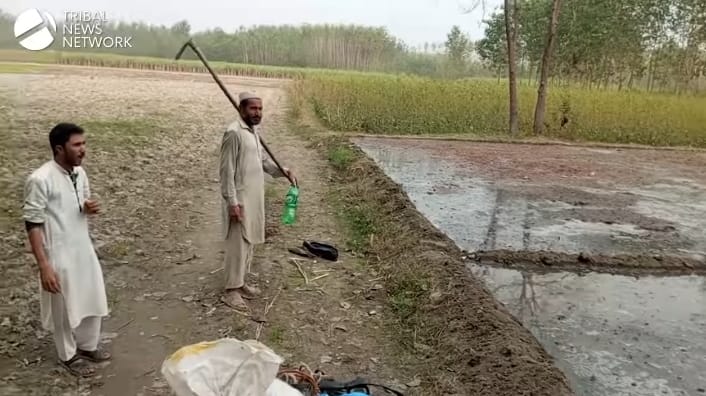
Peshawar – Agriculture in Khyber Pakhtunkhwa (KP) is under severe threat due to the growing impacts of climate change, including erratic rainfall, floods, droughts, heatwaves, and rising temperatures.
Local farmers are increasingly concerned about how to combat these challenges. The introduction of climate-resilient crop varieties and raising awareness among farmers remain critical yet formidable tasks in the region.
Wheat, a staple crop in KP, is sown in December, and a timely water supply is essential for optimal yield. However, farmers face difficulties not only from water scarcity but also from unseasonal rains, harsh winters, and intense storms.
Also Read: Former Lawmakers Call for Urgent Action on Deteriorating Security in Kurram and Merged Districts
Last April, stormy weather damaged 44,320 acres of crops across the province, with 35,948 acres of wheat suffering significant losses, according to the Crop Reporting Services Directorate of KP. Additionally, crops like chickpeas, fodder, mustard, canola, sugarcane, fruits, and vegetables were severely impacted by untimely rains.
Fazal Nabi, a farmer from Charsadda Road, Peshawar, cultivates wheat on his 2.5-acre farm after harvesting sugarcane. Despite relying on canal irrigation and rainfall, he anticipates a decline in wheat yield due to unpredictable weather patterns.
"Last year, I harvested 20 maunds (800 kg) of wheat, but yields are decreasing despite using high-quality seeds from the market," Nabi said. "The seeds can't withstand the changing weather."
Dr. Haroon Khan, Deputy Director of the Climate Change Center at the University of Agriculture, Peshawar, attributes declining crop yields to rising temperatures, heat stress, and drought. He highlighted the global and national focus on developing climate-resilient seeds to withstand heat and water scarcity.
Various wheat, rice, and maize varieties have been developed to endure these pressures. While biotechnology and genetic engineering are still limited in Pakistan, they hold promise for improving crop resilience.
Dr. Khan noted that partnerships with international organizations such as the International Crops Research Institute for the Semi-Arid Tropics (ICRISAT) and the International Maize and Wheat Improvement Center (CIMMYT) have introduced drought-tolerant wheat varieties in KP’s rainfed areas. Hybrid seeds for vegetables have also been developed to resist pests and heat, enhancing productivity. However, many farmers remain skeptical.
Asad Khan, a 45-year-old farmer from Mardan, shared his disappointment: "I buy new seeds every season, but my crops either wither due to heat or are destroyed by untimely rains. Even hybrid seeds fail to withstand extreme weather."
In response, Dr. Khan asserted that collaborations with the Plant Breeding and Genetics (PBG) Department have led to the development of drought-resistant maize and hybrid seeds that perform well under varying rainfall conditions.
The Food and Agriculture Organization (FAO) warns that climate change is disrupting agriculture worldwide, reducing crop yields by about 2% annually. By 2050, climate-induced agricultural losses could exceed $100 billion, posing severe risks to food security.
Dr. Khan emphasized the need for a comprehensive strategy to improve wheat production, including certified seed selection, soil health management, irrigation, pest control, and modern agricultural practices.
Climate change has altered rainfall, wind, and storm patterns, resulting in catastrophic events such as the October 2022 floods in Pakistan. Over 1,700 people lost their lives, more than 12,000 were injured, and over 30 million were affected. The economic loss was estimated at $30 billion.
While the government of Pakistan has introduced initiatives like the "National Climate Change Policy" to address these challenges, the results have been limited.
According to the 2023-24 Economic Survey, agricultural production is declining, and the threat of natural disasters such as floods and droughts is growing. Farmers believe that government efforts are insufficient to mitigate the adverse effects of climate change on agriculture.